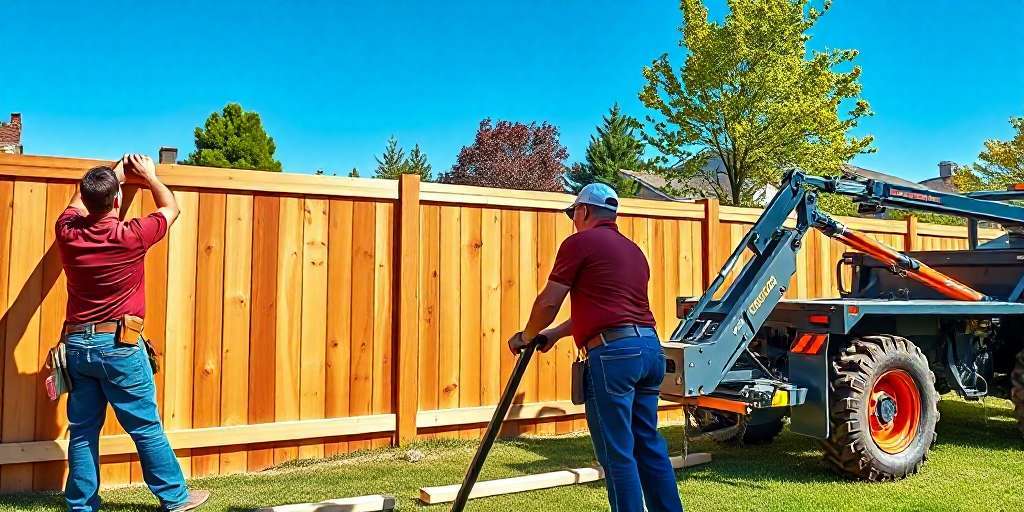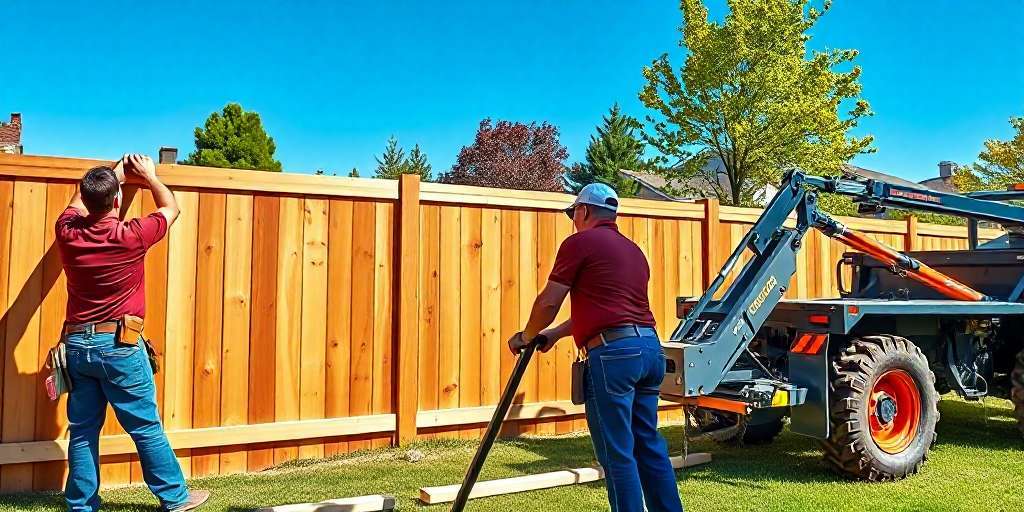
Your Guide to Choosing the Best for Your Property
Fence contractors play a vital role in the construction and installation of various types of fences. They offer valuable services for both residential and commercial properties, ensuring each project meets specific needs and local regulations. This article provides an overview of fence contractors, their services, and important factors to consider when hiring one. It also explores popular fencing materials and the installation process for a new fence.

Understanding Fence Contractors
Fence contractors play a crucial role in enhancing property boundaries and safety. Their expertise not only covers installation but extends to project planning and regulatory compliance.
What Do Fence Contractors Do?
Fence contractors specialize in a variety of tasks related to the installation and maintenance of fences. Their responsibilities include:
- Consulting with clients to determine their fencing needs and preferences.
- Recommending appropriate materials based on budget and functionality.
- Obtaining necessary permits and ensuring adherence to local regulations.
- Executing the installation process efficiently and accurately.
- Providing ongoing maintenance and repair services as needed.
Types of Fencing Services Offered
Diverse fencing options cater to varied requirements, ensuring that clients can find suitable solutions for their properties. Here are the key categories of services:
Residential and Commercial Fencing
Contractors are equipped to handle both residential and commercial fencing projects. Residential fencing focuses on aesthetics, privacy, and safety for homes, while commercial fencing prioritizes security and durability for businesses. Options include:
- Privacy fences for homes.
- Security fencing for commercial properties.
- Decorative fencing that enhances property appeal.
Custom Fence and Gate Solutions
Custom solutions allow property owners to tailor their projects to fit unique requirements. This may involve personalized designs, sizes, or materials that satisfy specific preferences or needs. Common offerings include:
- Custom-designed fences that align with a client’s vision.
- Gates that complement the fencing style and improve functionality.
- Innovative designs that accommodate landscaping or architectural features.
Choosing the Right Fence Contractor
Selecting a qualified fence contractor is crucial for a successful fencing project. Considerations such as experience, reputation, and availability can significantly impact the outcome of the installation process.
Factors to Consider When Hiring
When looking for a fence contractor, several factors can guide the decision-making process:
- Experience in the field: A contractor with extensive knowledge of various fence types and installation methods is preferred.
- Specialization: Some contractors focus on specific materials such as wood or vinyl, which may fit particular needs better.
- Licensing and insurance: Confirm that the contractor holds valid licenses and adequate insurance coverage to protect against potential liabilities.
- Project timeline: Understand the estimated timeline for completion to ensure it aligns with your schedule.
Checking Contractor Credentials
Verifying a contractor’s credentials is an essential step in the hiring process. Key aspects include:
- License verification: Check state regulations to ensure the contractor holds a valid license for fence installation.
- Insurance confirmation: Request proof of general liability insurance and workers’ compensation coverage for their employees.
- Trade associations: Membership in professional organizations can indicate a commitment to industry standards and ongoing education.
Client Reviews and Testimonials
Client feedback can provide insights into the contractor’s reliability and quality of work. Consider the following:
- Online reviews: Utilize websites that aggregate reviews to gauge the overall satisfaction of previous customers.
- Requesting references: Ask for contact information from past clients to hear firsthand about their experiences.
- Social media presence: Contractors with an active and positive social media profile may indicate transparency and engagement with their client base.
Popular Fencing Materials
Choosing the right fencing material is critical for durability, aesthetics, and functionality. Various materials offer unique benefits and considerations, making it essential to understand their features before selection.
Wood Fencing Installation
Wood fences are a classic choice, prized for their natural beauty and versatility. Available in various styles such as picket, privacy, and ranch, wooden fences can complement a variety of architectural designs. Installation typically involves:
- Preparing the site to ensure proper alignment and leveling.
- Selecting high-quality wood treated for weather resistance.
- Securing posts in concrete to provide stability.
Regular maintenance, including staining or sealing, is crucial to prolonging the life of wood fences and preventing decay.
Vinyl Fences: Pros and Cons
Vinyl fencing has gained popularity as a low-maintenance alternative to wood. It offers durability and a wide range of styles. Pros include:
- Resistance to fading, rotting, and pests.
- No need for painting or staining, making upkeep easier.
However, some cons exist, such as:
- Higher initial costs compared to wood.
- Less flexibility in design customization.
Chain Link Fencing Options
Chain link fencing is an economical option that provides security without sacrificing visibility. It is particularly suitable for defining property boundaries. Available in various heights and gauges, it offers:
- Affordability and quick installation.
- Low maintenance, requiring occasional cleaning.
Residential and Commercial Use
Chain link fences can serve both residential and commercial purposes. In residential applications, they are often used to enclose yards and gardens. For commercial properties, they can secure perimeters, storage units, or construction sites. Their adaptability makes them a practical choice for various environments.
Fence Installation Process
The fence installation process is crucial for ensuring the durability and integrity of the fence structure. Understanding each step involved can enhance the overall experience and ensure a successful project.
Initial Consultation and Quote
The process begins with an initial consultation, where homeowners discuss their specific needs with the fence contractor. This meeting allows homeowners to outline their goals, preferences, and potential design ideas. The contractor will evaluate the site and offer suggestions based on their expertise.
Following the consultation, a detailed quote is provided. This quote includes an itemized list of materials, labor costs, and any additional fees. Clear communication about the budget helps avoid surprises later on.
Property Lines and Surveys
Before installation begins, it’s imperative to confirm property boundaries. This step ensures that the fence is erected legally and within the proper lines. Contractors usually work with local municipalities to verify property lines and may also suggest obtaining a professional survey.
Understanding easements on the property is essential, as they may restrict where a fence can be placed. This proactive approach can prevent disputes with neighbors or issues with local authorities.
Installation Day: What to Expect
On the installation day, the contractor and their team will arrive prepared to execute the project efficiently. The first step involves marking the layout according to the agreed design. Once the layout is confirmed, digging begins, followed by setting the posts in concrete.
As the installation progresses, the team ensures proper alignment and spacing of each fence panel. It’s vital to follow the designed plan closely to maintain a consistent appearance and functionality.
Ensuring Quality Control
Quality control is prioritized throughout the installation process. Contractors monitor each phase to guarantee that the materials used meet durability standards and that installation techniques align with industry best practices. A final walkthrough is typically conducted to ensure the fence meets both aesthetic and structural requirements.
Costs and Financing Options
Understanding the costs associated with fence installation and the financing options available is crucial for homeowners. This section explores budgeting strategies and different financing avenues to help manage expenses effectively.
Understanding Your Budget and Costs
Establishing a budget is a fundamental step in the fencing process. The costs can vary significantly based on several factors, including:
- Type of Material: Wooden fences typically require more maintenance than vinyl or metal options. Each material comes with different pricing structures.
- Length of the Fence: The total linear feet needed will directly influence material costs and labor fees.
- Labor Rates: Hiring a fence contractor involves labor costs, which can vary based on expertise and geographic location.
- Permitting Fees: Local regulations may require a permit, adding to the overall expense of the project.
On average, homeowners can expect to spend around $6,800 for fence installation. This figure can fluctuate based on choices made during the planning phase.
Exploring Financing Options
For many, upfront costs can be a hurdle. Fortunately, various financing options are available to help ease financial strain:
- Payment Plans: Many contractors offer flexible payment plans, allowing homeowners to pay in installments rather than a lump sum.
- Personal Loans: Homeowners can consider personal loans from banks or credit unions, often providing lower interest rates compared to credit cards.
- Home Equity Lines of Credit (HELOC): This option allows access to funds based on the equity built up in a home, which can be useful for larger projects.
- Credit Cards: Some may choose to use credit cards for smaller projects, though attention should be paid to interest rates.
Researching these options can lead to a more manageable approach for financing fencing projects while keeping the long-term costs in mind.
Maintaining Your New Fence
Proper maintenance is essential for ensuring the longevity and durability of a newly installed fence. Regular upkeep can prevent costly repairs and enhance the aesthetic appeal of the property.
Routine Maintenance Tips
To keep a fence in excellent condition, a few simple maintenance tasks should be performed regularly. These tasks vary by material type and can include:
- Wood Fences: Inspect for signs of rotting or damage, and apply paint or stain every few years to protect against the elements.
- Vinyl Fences: Clean occasionally to prevent mold growth. A mild soap solution and a soft brush work well for removing dirt and grime.
- Metal Fences: Check for rust spots and touch up paint as needed. Regular cleaning can help prevent corrosion.
- Chain Link Fences: Inspect for any loose or bent sections. A quick rinse with a hose can keep them looking tidy.
Dealing with Repairs
Over time, fences may require repairs due to wear and tear, severe weather, or unforeseen damage. It is important to address these issues promptly to avoid further degradation.
- Small repairs, such as replacing a few wooden slats or tightening bolts, can often be completed by the homeowner.
- Larger issues, like significant rot or structural damage, may necessitate the expertise of a professional contractor to ensure a proper fix.
- Regular inspections can help identify problems early, making repairs easier and less costly.
Labor Warranty Considerations
When hiring a contractor for fence installation, understanding the labor warranty is critical. A robust warranty can provide peace of mind and protect the investment over time. Consider the following:
- Verify the duration of the warranty and what specific repairs or issues it covers.
- Check if there are conditions that void the warranty, such as neglecting maintenance or making unauthorized modifications.
- Request documentation outlining the warranty terms for reference in the future.
Finding Fence Contractors Near Me
Finding local fence contractors can greatly simplify the process of installation and maintenance. Proximity often ensures better service and communication, leading to a successful project.
Searching for Local Contractors
Begin the search for fence contractors by utilizing various resources available online. Websites specializing in contractor listings can provide a list of professionals in the area. Local directories, community boards, and home improvement websites are also valuable tools for finding nearby services. It’s advisable to compile a list of potential contractors based on customer ratings and previous work experiences.
- Online reviews and ratings
- Social media platforms for local recommendations
- Word of mouth from friends and family
- Local hardware stores and home improvement centers
Benefits of Choosing Nearby Services
Selecting a nearby contractor offers several advantages. Local professionals are typically more familiar with the building codes and regulations that apply to the area. Their experience with local weather conditions can influence the choice of fencing materials. Furthermore, having a contractor in close proximity can facilitate easier communication and quicker response times for any questions or concerns during the project.
Specific Searches: Chain Link & Vinyl Fence Options
Narrowing the search to specific types of fencing can help find the right contractors who specialize in the desired materials. For those interested in chain link fences, it’s beneficial to look for contractors who have demonstrated experience in providing secure and durable solutions for both residential and commercial properties. On the other hand, if vinyl fencing is preferred, identifying contractors who offer customization and maintenance services can enhance the project outcome.
- For chain link fences, seek professionals with relevant industry certifications.
- When considering vinyl, look for contractors who provide a variety of colors and styles.

